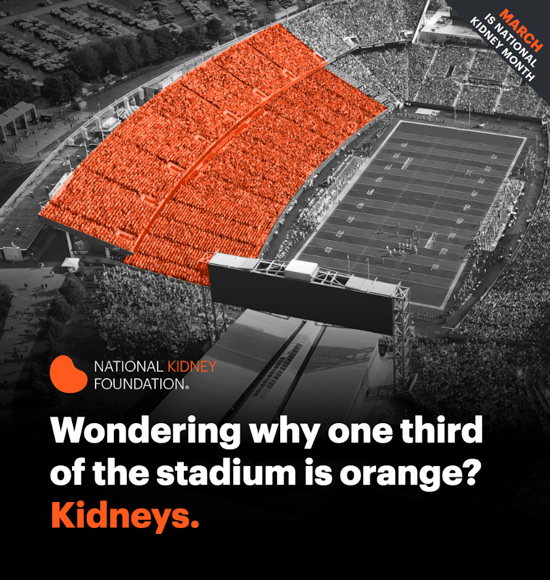 Did you know? One in three American adults are at risk for kidney disease, and many of the 37 million Americans with kidney disease do not know it.
Did you know? One in three American adults are at risk for kidney disease, and many of the 37 million Americans with kidney disease do not know it.
Kidney disease has no symptoms in its early stages, making it an often silent but serious disease.
For National Kidney Month, we want you to know how to detect and deter kidney disease.
What is Kidney Disease?
Your kidneys keep you healthy by removing waste products and excess fluid from your body. These powerhouse organs also help regulate your body’s salt, potassium and acid content. Kidney disease occurs when the kidneys lose function over time.
Kidney disease has no symptoms until it is very advanced, making early detection essential. When your kidneys reach about 25% of their normal function, some symptoms include: leg swelling, eye puffiness, difficulty breathing, poor appetite and nausea.
Lasting damage to the kidneys is called chronic kidney disease. If untreated it will get worse over time. Kidney failure, or end-stage renal disease (ESRD), is the last stage of chronic kidney disease. If your kidneys fail, you will need a kidney transplant or dialysis to survive.
Risk Factors
Because early kidney disease has no symptoms, it’s critical to know whether you are at risk. Early detection can slow disease progression and keep you healthier longer. Top risk factors include:
- Diabetes
- High blood pressure
- Family history
- Smoking
- Obesity
- Heart disease
- Age 60 & above
If you have any of these risk factors, schedule a simple urine or blood test. Even if you are experiencing no symptoms, you could be losing kidney function. Early treatment can help slow progression and disease-related complications.
Take a minute to answer a few simple questions and find out if you’re in the 33%.
Just one minute might save your life.
Myth Busting: What can you do?
Many people believe there’s nothing we can do about kidney disease. However, there are many steps you can take to slow down or even reverse kidney damage.
-
Take care of contributing risk factors
By keeping your blood pressure under control, exercising regularly and quitting habits such as excessive drinking and smoking, for example, you can greatly reduce the risk of kidney disease.
-
Get a blood or urine test
Talk to your doctor about checking your kidney function. Depending on your risk factors, a urine or blood test taken once or twice a year can detect early kidney function loss.
-
Avoid medications that affect the kidneys
Certain over-the-counter medications can be hard on the kidneys. Avoid or limit NSAIDs (like aspirin, ibuprofen and naproxen), herbal supplements, diuretics and antibiotics. Speak with your physician or pharmacist for recommendations.
-
Treat your disease to slow progression
In addition to tried and true therapies like dialysis, there are several medical advancements that show great promise in treating kidney disease. Research on new medications and kidney replacement devices give hope to millions of Americans.
Are you at risk? Take the first step today.
Visit us at HMG and schedule an appointment to get screened.


